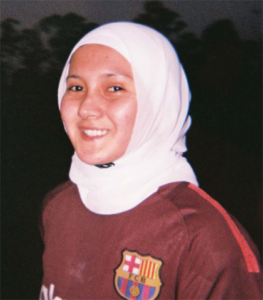Refugees, football and opportunity
A new global soccer initiative is exploring the stories of refugees and asylum seekers whose lives have been transformed by the sport.
‘Goal Click’ is football story telling project that, in partnership with the United Nations refugee agency UNHCR, is chronicling personal stories from refugees and football’s role in helping re-anchor lives and open paths to opportunity.
 The project finds inspirational people from all over the world and asks them to tell stories about their own football lives and communities – initially using disposable cameras and their own words.
The project finds inspirational people from all over the world and asks them to tell stories about their own football lives and communities – initially using disposable cameras and their own words.
In 2020 the project launched a new series called Goal Clock Refugees which collaborates with refugees and asylum seekers around the world to tell their personal stories and experiences through football in refugee camps and in host communities.
One story subject was Shegofa Hassani, an Afghan refugee in Australia. She say football has helped changed attitudes among her own community.
“A lot of people still don’t think Afghan girls should play sport, and this allows us an opportunity to prove them wrong and stay active and socially connected,” said Shegofa, a Football United player and ambassador, who now leads the Sydney United Girls program.
“I want more Afghan girls to dream big and follow those dreams. Too many of our girls are not following their dreams because of cultural, family and financial barriers. We aim to eliminate barriers by building trust, being visible and doing our thing,” Shegofa said.
Goal Click gives people the chance to tell their own story rather than having an outsider come in to tell their stories.
The projects founders say the benefits to this storytelling approach are huge.
“The photos and stories become very raw and intimate, going behind-the-scenes into people’s lives and communities in a way that would not otherwise be possible. The storytellers know they are at the centre of their own story and have a platform to tell it, which is a very powerful message,” the organisation’s website says.
“There is also a sense of equality between all the Goal Click storytellers. Everyone has the same tools to create their story, no matter where they are from in the world – from Africa to Nepal,” it says.
“Very early on in the life of Goal Click, we saw that refugees and asylum seekers were often the most unheard and silenced group of people in societies around the world.
“Now more than ever is a time to hear the voices and see the perspectives of the marginalised and dispossessed around the world.
“Goal Click’s mission is to help people understand the world, other cultures, and other people through the common language of football. Football is as close to a universal language as you can get.
“Framing a difficult subject like refugee issues through sport and specifically football allows people to understand someone else’s story in a way that might not otherwise be possible. In fact, they may not have been interested otherwise,” the organisation says.
Meanwhile famed Manchester United footballer Mohamed Salah has taken center stage alongside refugee youth at the first-ever virtual UN General Assembly (UNGA), calling for every child to access a quality education, including refugees.
Mr Salah, an Ambassador for UNHCR’s Instant Network Schools (INS) program, teamed up with refugee students from INS schools in Kenya, Tanzania and South Sudan, to address world leaders at assembly.
“We must make sure that all young people – including refugees – get an education. Now is the time to make sure refugee students don’t get left behind. And with COVID-19, connected education is extremely important,” he said.
“Refugee children have been through so much but remain incredibly strong. They have many dreams and hopes, like all children. Especially now as we face COVID-19, education is everything to refugee children and they should not be left out,” Mr Salah said.
During the COVID-19 pandemic around 90 per cent of the world’s school-age children have been affected by school closures, including an estimated seven million refugees.
Adapting to the limitations imposed by COVID-19 has been particularly difficult for the 85 per cent of the world’s refugees who live in developing or least developed countries.
Mobile phones, tablets, laptops, connectivity, even radio sets are often not readily available to displaced communities.
The UNHCR predicted earlier this month that unless immediate and bold action is taken by the international community to beat back the catastrophic effects of COVID-19 on refugee education, the potential of millions of young refugees living in some of the world’s most vulnerable communities will be further threatened.












